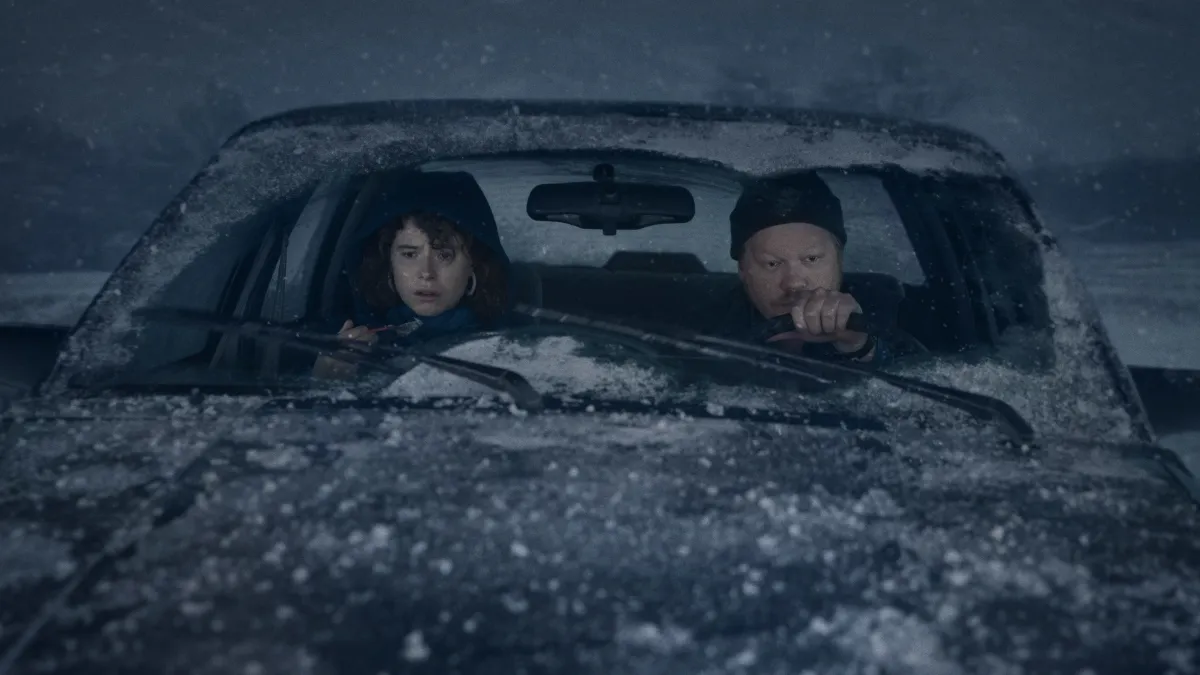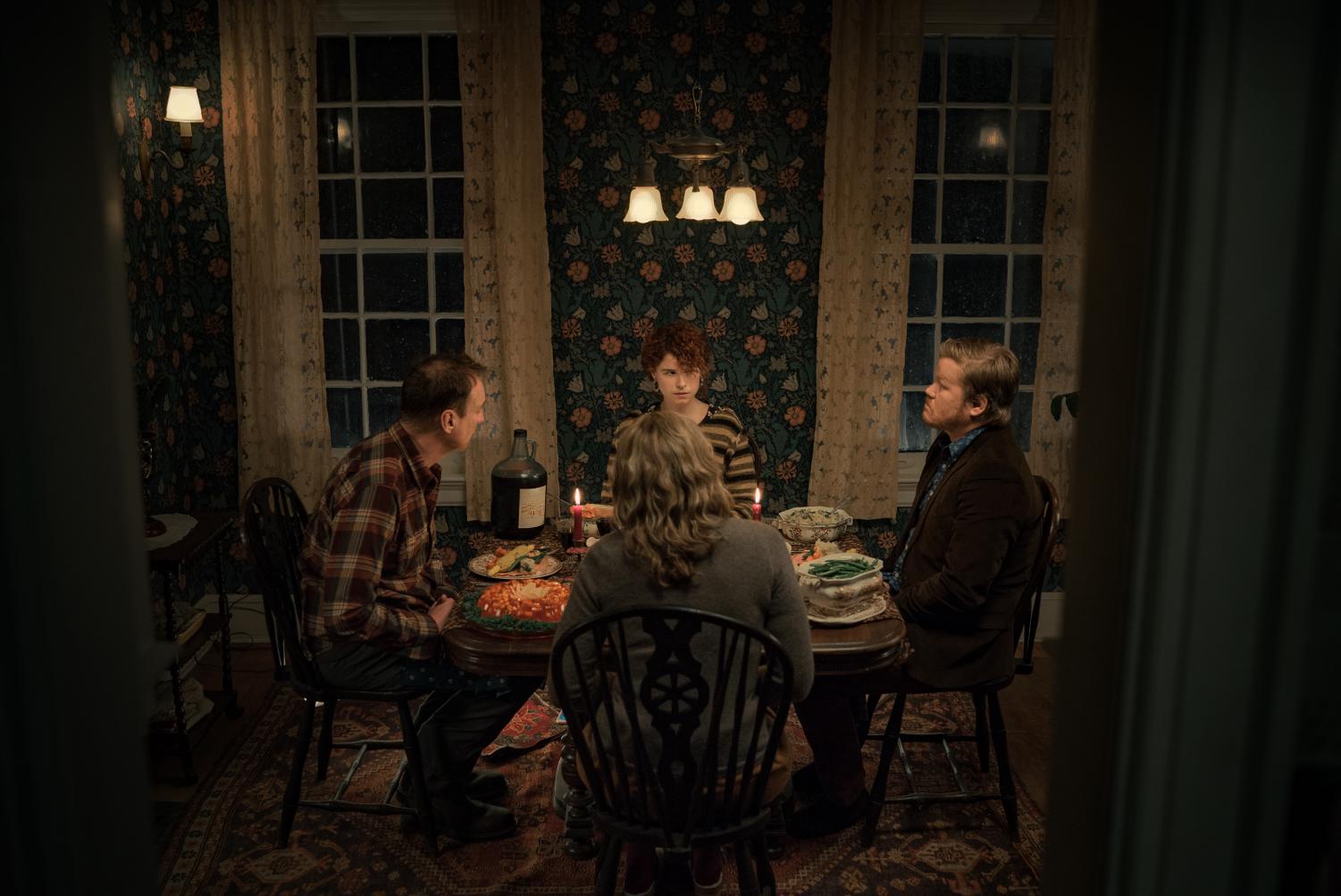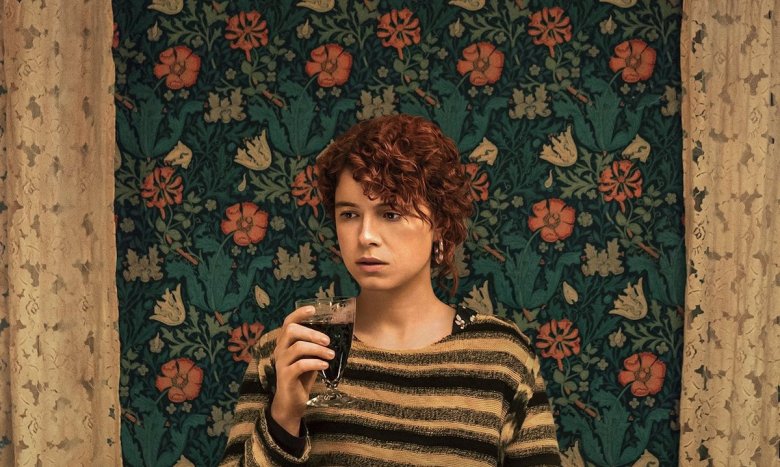I'm Thinking of Ending Things: Bad Romance
Charlie Kaufman's latest imagines a world where the only light at the end of the tunnel for damaged men is love. But why?

(Welcome to the Wednesday newsletter! Each week, I’m publishing a new pop culture essay from a freelancer. Remember: Your subscription fee helps me pay these freelancers for their efforts! This week: Steve Erickson looks at Hollywood's compulsory romanticism and the bleak prospects for men envisioned therein.)
When I’m Thinking of Ending Things dropped on Netflix in early September 2020, the Charlie Kaufman film accidentally wound up describing the isolation many of us were experiencing during the pandemic and ensuing quarantine.
An hour of the movie’s runtime consists of murky images of Jake (Jesse Plemons), a man given to ruminations about the books he’s read and the films he’s seen, driving with a woman given several names (Jessie Buckley). The two, a couple that only exists in the imagination of the “true” Jake, an elderly janitor picturing a younger self and his fantasy girlfriend, are traveling to Jake’s parents’ house. The sound is deliberately muddy throughout. The car is obviously stuck on a soundstage, being pelted with fake snow, and Kaufman shoots this section in Academy ratio.
I’m Thinking of Ending Things’ depiction of feeling trapped, both physically and emotionally, hit home for me. Its mood of isolation leading to depression and self-destructive behavior could have come from a documentary about life amid Covid-19.
The first time I saw the film (in one, 135-minute sitting), I’m Thinking of Ending Things felt devastatingly sad. Charlie Kaufman’s films have centered on middle-aged men living a bleak existence, often led astray by their own desires. That has been especially true since Kaufman began directing with 2008’s Synecdoche, New York. Kaufman’s films suggest that culture is just another way for lonely men to build a world they can crawl inside while excluding others.

Spending so much time in my apartment over the last year led to a great deal of introspection, much of it about a nagging imposter syndrome I felt about being gay, even though I was okay with the fact that it had been years since my last date. Many visions of queer liberation risk turning into a series of rigid rules about the right way to be gay. Without defending Pete Buttigieg’s politics, one could see this tendency in the L.A. Review of Books essay claiming that he and his husband Chasten are really straight. Despite queer theory’s vision of a certain vagueness about exact sexual identity being productive, the LGBTQ community is notorious for gatekeeping. I never wanted to alter my body to fit a certain image of what gay men should look like, but I felt like I had paid a social cost for not doing so.
I’m Thinking of Ending Things tackles this idea of men being held to very specific standards, albeit in a different fashion. It traces Jake’s failure to an inability to move from adolescence into a mature heterosexual relationship; in a dance scene, the performer representing the janitor stabs a younger version of Jake to death, just as he and Buckley’s character are about to get married.
I’m Thinking of Ending Things falls into a long line of films about men who fall in love with women that aren’t quite human, from Metropolis to Blade Runner to Ex Machina. Jake has killed time at a dull job by fantasizing another timeline in which he didn’t age into a lonely, single man. But his creation escapes him. Buckley gets a voice-over of her own, in which her character plans to break up with Jake, leading to one possible interpretation of the film’s title.
Although it’s about a man who dreams up a relationship with a woman, I’m Thinking of Ending Things intersects with the concept of “queer time.” In her essay “Queer Time: The Alternative to ‘Adulting’,” Sara Jaffe writes:
These scholars [Jennifer M. Silva and Pamela Aronson] both frame the disappearance of the conventional path into adulthood as a loss. But what about those for whom that path has always been illusory?... [Queerness] is inflected by time-warping experiences as diverse as coming out, gender transitions, and generation-defining tragedies such as the AIDS epidemic. That is, queerness is constituted by its difference from conventional imperatives of time.
I’m Thinking of Ending Things implies that heterosexuals, too, are now experiencing the end of “adulting,” but it portrays this dissolution as a tragedy. Even the concept of adulting becomes literal — Jake never escapes his old high school and dies outside it.
The movies have often glamorized a hedonistic lifestyle for single heterosexual men — think James Bond or Indiana Jones. But the movies have also suggested that single men are dangerous for everyone else. Travis Bickle and Edward Norton’s unnamed Fight Club narrator offer visions of men’s loneliness and ineptness with women boiling over into violence. On the Comedy Central show Nathan For You, Nathan Fielder played a version of himself who thought he was a ladies’ man but whose combination of awkwardness and blithe entitlement around women made him look like a sociopathic creep. YouTube video essayist Big Joel has compared Fielder’s persona with Patrick Bateman from American Psycho. That 2000 film shows the ugly side of the partying and wealth celebrated by Bond movies, where the notion that everyone else exists for Bateman’s pleasure leads to him murdering women with chainsaws. While it’s more ambiguous about its provenance than I’m Thinking of Ending Things, the plot of American Psycho probably takes place in its narrator’s head as well, as both book and film suggest that at least some of Bateman’s murders are mere fantasies.
These pop culture images coincide with the discourse about incels and the far right. Instead of seeing movies like Taxi Driver, Fight Club, or American Psycho as critiques of a dangerous version of masculinity and a society that tolerates violence when it’s aimed at marginalized people, some incels have identified with characters like Bateman and Tyler Durden.

But so much thought about incels, especially coming from right-leaning pundits, takes their professions of loneliness and beliefs about the source of their problems at face value. (Many are genuinely suffering from mental health issues, but they also participate in a subculture that glamorizes depression and even suicide while telling themselves that getting medical help is a form of selling out to the normies.) Of course, loneliness and conviction can be cured by sex with beautiful women! Popular psychologist and author Jordan Peterson became a celebrity selling self-help books telling young men to “grow the hell up, accept some responsibility, and live an honorable life” (as he told the New York Times). Right now, young heterosexual men might be living lives closer to their queer counterparts and would benefit from realizing that they’re not losers for being single, Peterson called for “enforced monogamy” to prevent future murderers like the Canadian incel Aleck Minassian, who killed 10 people and injured 16 in Toronto in 2018.
In his 2018 New York Times op-ed “The Redistribution of Sex,” Ross Douthat, lifting heavily from French novelist Michel Houellbecq, blamed the sexual revolution for introducing neoliberalism to the libido, preventing everyone from their supposed right to a sex life. (This argument was framed in a more benign way by an essay by philosopher Amia Srinivisan, which suggested that the answer is no but “the question of who is and isn’t desired is a political one.”) Musing about robotic sex workers, Douthat echoed Blade Runner, but in conflating AI and the human sex workers at present as a possible solution to the problem of incels’ loneliness and horniness, he ignored the physical damage such men frequently do to the latter.
While Peterson claims that monogamous marriage is the answer to male aggression, he ignores the statistics about the ubiquity of domestic violence (and the fact that it can be a gateway to mass shootings) and acquaintance rape. Marriage is not a magic cure-all for men’s violence. Both Douthat and Peterson take incels at their word that their problems stem from not getting laid, rather than a larger alienation affecting everyone under capitalism. They also seem to believe that the destructive tendencies often attributed to incels would go away if only they could get some (under the proper circumstances, of course). It’s ludicrous to think the problems of men who stan killers like Minassian and Elliot Rodger, the young man who murdered six college students in Isla Vista, California in 2014, would be resolved if they had sex.
I’m Thinking of Ending Things buys into the same cultural conservatism, albeit in a far more ambiguous way. Jake’s working-class life is tied to his inability to successfully date women. The film attempts to critique his sexism, with some success, but the fact that its main female character is a projection of his imagination with no consistent name of her own says something about Kaufman’s limits too. Ideas that dating, marriage, and middle-class labor are markers of mental health, while culture is at best a means for men to hold obscure reference points over women and at worst a drug causing dangerous delusions, run throughout the film.
The more I thought about I’m Thinking of Ending Things, the more I was troubled by its underlying attitudes. I’ve been single the majority of my life, and I’ve been dogged by a sense of guilt about that. For a long time, I thought real adulthood would begin with my first long-term relationship. Ultimately, I’m Thinking of Ending Things led to a rabbit hole of thought in which I eventually realized that I’m aromantic. That helped me reconsider how even media as formally adventurous as I’m Thinking of Ending Things sells us on a distorted idea of life’s possibilities. The notion that it’s liberating for women to be happy with single life has become a popular one, but no one seems to be talking about what rejecting compulsory romance means for LGBTQ people.
While American culture presses heterosexuals to get married, only recently has it accepted same-gender marriage. About five years ago, I wanted to meet a man I would marry before my parents died. They didn’t pressure me to do so themselves, but I felt that I was living out some “Straight Gay” trope (to use TV Tropes’ phrase) by not being in a relationship and/or having frequent sex. If the option for marriage was newly available to me, I thought I was being a bad gay by not taking it. This led to a pursuit of dating that left me feeling like my life was ruined because it didn’t work out. I shouldn’t have been surprised that starting to date someone with the intention that it would lead to marriage proved to be a terrible idea, leading to awkward interactions that didn’t work out in the long run, pressing men too hard for an intimacy we never actually achieved, and ending in a sense of despair when a few dates proved to lead nowhere.
I could see friends who had developed compulsive relationships to online dating, and I realized I was happier being single than they were trying not to be. But the idea that staying out of a relationship can be liberating is almost never proposed for queer men. Indeed, back when he was making a conservative case for same-gender marriage, Andrew Sullivan argued that it was necessary to tame gay men’s wild libidos and stop the spread of HIV. Romantic love isn’t the be-all and end-all of life, nor does its absence automatically turn men into bitter misogynists.
As for me, I’ve realized that “failure” at romantic love indicated a lack of desire for it in the first place. Queer time isn’t necessarily a road to happiness. I can recognize that my life might have turned out much differently if I had been able to date other boys at 16. The differences in maturation forced upon many LGBTQ people can be liberating, but for me, the fact that I was hiding something so crucial about myself as a teenager led to a difficulty trusting other people.
I'm Thinking of Ending Things' ideas about men’s failure hint at a feminist critique of male fantasy but wind up buying into a deterministic idea about men’s lives that offers no way out from the pitfalls (most of which are real) it lays out. Immediately after watching the film, I felt seen by it, but I soon realized how inaccurate and narrow that vision was. The film never even considers the possibility of finding other forms of intimacy in friendship or seeing something liberating about getting off a treadmill where dating and eventual long-term, monogamous relationships are compulsory. It ends up as imprisoned as Jake and the woman, trapped in their car.
Episodes is published three times per week and edited by Emily VanDerWerff. Mondays feature her thoughts on assorted topics. Wednesdays offer pop culture thoughts from freelance writers. Fridays are TV recaps written by Emily. The Wednesday and Friday editions are only available to subscribers. Suggest topics for future installments via email or on Twitter. Read more of Emily's work at Vox.



